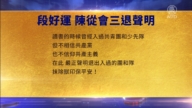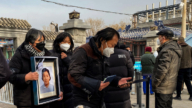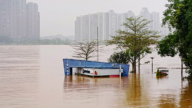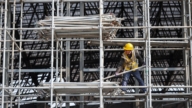【新唐人2013年11月20日訊】隨著中國大陸南水北調工程通水進入倒計時,這項耗資5千億、總工期長達50年的「三峽孿生姐妹工程」,所引發的爭議,再度被輿論所關注。人們發現,當年反對這一工程的專家所擔憂的問題和作出的預測,在工程即將收尾的今天逐一應驗,有些則成為無解難題。而這些隱患在通水後將繼續惡化,造成不可挽回的損失。因此水利專家王維洛指出:南水北調工程是比三峽更可怕的工程。
所謂南水北調,顧名思義就是將南方的水往北調的工程——通過東線、西線、中線三條「運河」把長江的水輸送到北方地區。這項工程最早的設想,來源於1952年毛澤東異想天開的一句「南方水多,北方水少,如有可能,借點水來也是可以的。」但工程自提出那一刻起,便始終與巨大的爭議相伴。
持反對觀點的專家、學者們認為,南水北調工程將會對自然生態環境造成浩劫性破壞,包括導致水體污染擴大、血吸蟲病北移、土壤鹽漬化、江水資源失衡、水生生物種群減少甚至滅絕等等,而這些不利的影響自工程上馬後,已經逐漸顯露。
前長江水資源保護局局長水資源保護專家翁立達:「這個調水以後,肯定有些會對長江有點影響,調出區和調入區都會有影響,調水以後對長江的水量可能會減少,特別是中線對漢江中下游會有影響,這個是完全可能。」
四川省地礦局區域地質調查隊工程師範曉:「東線主要問題它就是水污染,因為它經過淮河流域,是我們國家水質污染最厲害的一個區域,所以這個污水調過去以後,實際上很難應用的。 」
據官方數據顯示,南水北調的東線和中線沿線,要經過眾多癌症高發區,而工程的建設又催生了無數「癌症村」。
今年6月2號,南水北調工程山東東平八里灣站試水,將大量北上污水放入東平湖,導致湖魚死絕,漁民跪地大哭。而這樣的毒水,將在2014年全面進入北京、天津等城市。對此,香港《蘋果日報》預言,南水北調工程可能成為世界最大的「致癌工程」。
此外,專家們還指出,南水北調工程誘發的地震等自然災害,將嚴重危害沿線百姓的生命安全。
劉素梅、徐禮華等多名中國地震專家,在《國際地球物理學報》上發表文章預期,南水北調中線項目的水源地——丹江口水庫,一旦大壩加高,有可能觸發4級以上的地震活動。
範曉:「雖然沒正式送水,一個是移民的問題,現在已經出現,大量移民安置,這是一個很困難的問題,而且 導致庫區移民的生活水平下降。另外的話,這個沿線的話,也是一個地質災害比較多的,它主要是地震,我們國家很多的一個地震帶,這個地震的活動對送水工程的影響,它的安全性,也是很大問題。」
另據有關數據顯示,南水北調工程還造成了34萬農業人口被迫遷移,數十萬畝良田沉入江底。由於安置條件差,失去耕地的移民生活極為悲慘淒涼。一名河南淅川移民在網上哭訴,移民後,他們失去了平均每人3畝的耕地和每家數間的瓦房,取而代之的是每人每年僅有60元人民幣的補助款,住在擁擠漏雨的豆腐渣安置房裡,過著斷糧缺水的生活。
據估算,南水北調引水入京成本是每噸水10元,而目前海水淡化的成本在每噸4元左右,為何中共在眾多專家學者極力反對的情況下,一意孤行堅持南水北調?
範曉:「因為它帶上了很多政治的色彩,當然這個裡面也有利益的驅使,當然它是少數強勢利益集團,比如說具體做南水北調工程的,水利部下面的一些大的公司,因為它可以從裏面獲得很多利益,一旦批准上馬,國家的投資或者貸款就大量的來。」
至於南水北調工程以後的長遠效益,範曉說,中共當局完全不去考慮。
專家們指出,當局完全可以通過節水、治污、利用再生水等方式緩解中國當前的水危機,而不是採取南水北調這種「拆東牆補西牆」的愚蠢做法,這樣只能導致缺水範圍擴大,直到全中國永久性缺水。
採訪編輯/張天宇 後製/陳建銘
Signs of Disaster Show at The Completion of River Projects
The countdown for the start of China’s South to North
water diversion project is underway.
The project will take 50 years to complete, and it together with
it’s twin, the Three Gorges Dam, will cost an estimated
500 billion yuan ($82 billion).
Since the beginning of this project, experts have worried and
warned against the possible disasters it could bring.
Signs have started to show, and the disasters are believed to
continue to worsen and finally become unsolvable.
Water conservancy expert Wang Weiluo says,
“This water diversion project is more detrimental than
the Three Gorges Dam."
The South to North water diversion project, by definition,
transfers water from the Yangtze River to China’s north
via eastern, western, and central routes.
The idea came a remark made by Mao Zedong in 1952,
“Southern water is plentiful, northern water scarce.
If at all possible, borrowing some water would be good."
Ever since, intense debates have accompanied the project.
Opponents argue that these massive dam projects are
wreaking havoc on river systems across China,
from water pollution, to transmission of parasitic diseases,
soil salinization, river ecosystem imbalance, devastating and
even extinction of species.
Many of these adverse effects have gradually emerged
since the beginning of the project.
Weng Lida, former Yangtze River Water Resources Protection
Bureau director: “Water diversion will certainly affect both
the Yangtze River and the diversion areas.
The diversion will evaporate the Yangtze River and
cause water reduction.
The central route will also impact the downstream
Han River (a tributary of the Yangtze River)."
Fan Xiao, engineer at the Regional Geological and Mineral
Bureau of Sichuan Province: “Water pollution is the main
issue for the eastern route which goes through the Huai basin,
the most seriously polluted reservoir in China.
This water cannot be used at all."
Official documents show that both eastern and central routes
pass many cancer prone areas.
Many more cancer villages also emerged
along with the constructions of the dams.
On June 2 this year, a test of the water diversion project
was conducted at Bali station of Dongping county, Shandong.
As the polluted water was poured into the Dongping Lake,
lake fish completely died out and
local fishermen dropped to their knees crying.
Such toxic water will be going to Beijing and Tianjin.
Hong Kong-based Apple Daily reports that the project
could turn into the world’s biggest ‘cancer project’.
Experts warn that earthquakes and other natural disasters
induced by these massive dams can also seriously endanger
human life in the areas near the rivers.
Scientists Liu Sumei, Xu Lihua and Pradeep Talwani said in
a Geophysical Journal International article that raising
the Danjiangkou Reservoir’s water level, located in the centre
of the route, could trigger earthquakes above magnitude 4.
Fan Xiao: “Although these dams have not formally started
operation, the relocation problem has become a major issue.
It is destroying the standard of living for people in the area.
These dams are also built around the high risk seismic zones,
posing huge dangers to construction
and the security of these dams."
The dams have forced an estimated 340,000 people to migrate
and submerged hundreds of thousands of acres of farmlands.
Those landless peasants, receiving poor compensation,
have since lived in poverty.
A migrant from Xichuan County, Henan grieved online,
saying that they’ve lost their land and homes due to relocation.
Given about 60 yuan ($10) in annual compensation per person,
they have since lived in shabby temporary housing
without food and water.
The cost to divert water from southern China to Beijing
is estimated at 10 yuan ($1.64) per ton, and desalination costs
are currently about 4 yuan ($0.66) per ton.
So why does the Communist regime insist on the project
despite many oppositions?
Fan Xiao: “It is driven by politics and interests,
of course, the interests of those who are in power.
For instance, those who are in charge of the project and
the companies under the Ministry of Water Resources
will profit.
Once it’s approved, the state investment and loans will follow."
As for the long-term effects of the water diversion project,
Fan Xiao says that the Communist regime doesn’t care at all.
Many experts have indicated that the crisis of water resources
in China can be reduced through conserving water,
treating pollution, and recycling water.
This south to north water diversion project is criticized
as a mistake at the expense of all.
It is not only ineffective but also detrimental to the water
reservoir of the whole country.
Interview & Edit/ZhangTianyu Post-Production/ChenJianmin



























